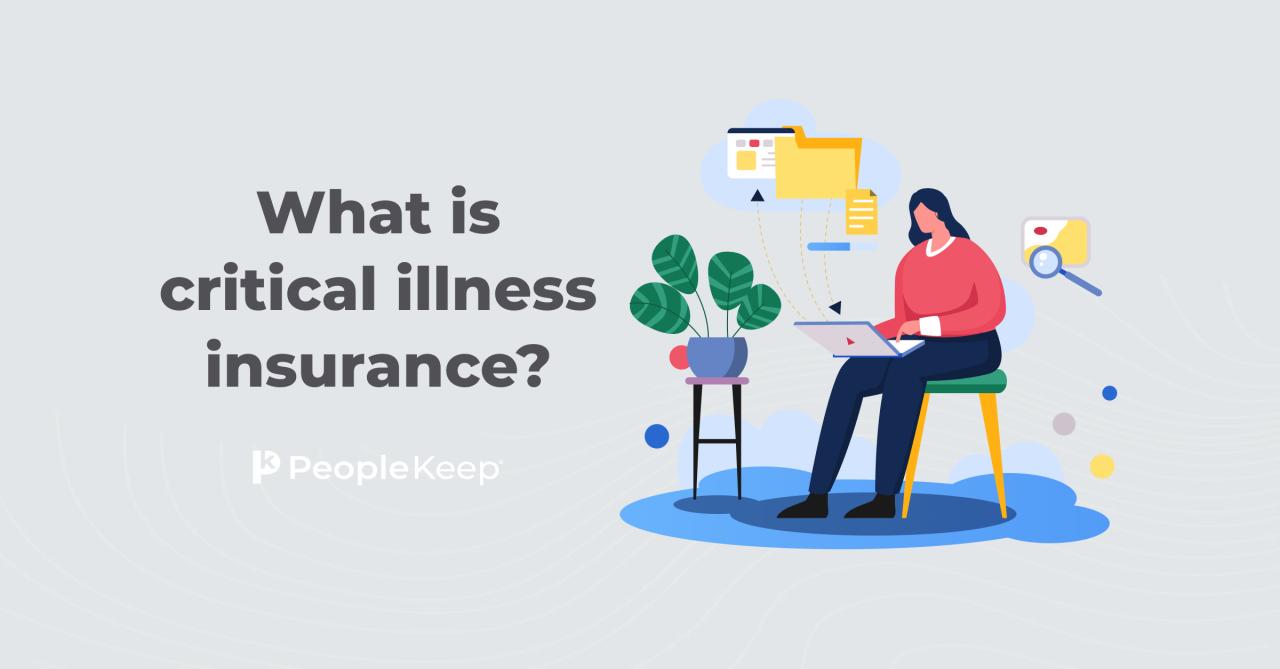In the realm of personal finance, critical illness insurance emerges as a beacon of hope, offering a lifeline during life’s most unforeseen storms. This specialized coverage provides a financial safety net to safeguard individuals and their loved ones against the devastating financial consequences of critical illnesses.
As medical advancements continue to redefine the boundaries of healthcare, so too does the prevalence of life-threatening conditions. Critical illness insurance recognizes this evolving landscape and provides a crucial layer of protection, ensuring peace of mind and financial stability when illness strikes.
Definition of Critical Illness Insurance
Critical illness insurance is a type of insurance that provides financial protection in the event that you are diagnosed with a critical illness. Critical illnesses are typically defined as life-threatening conditions that require extensive medical treatment, such as cancer, heart attack, stroke, kidney failure, and major organ transplants.
The benefits of critical illness insurance can include:
- A lump sum payment that can be used to cover medical expenses, lost income, or other financial obligations.
- Access to specialized medical care and treatment.
- Peace of mind knowing that you and your family will be financially protected in the event of a critical illness.
Examples of Covered Conditions
The specific conditions that are covered by critical illness insurance vary from policy to policy. However, some of the most common covered conditions include:
- Cancer
- Heart attack
- Stroke
- Kidney failure
- Major organ transplants
- Paralysis
- Loss of limbs
- Blindness
- Deafness
- Severe burns
- Multiple sclerosis
- Parkinson’s disease
- Alzheimer’s disease
It is important to read the policy carefully before you purchase critical illness insurance to make sure that you understand the specific conditions that are covered.
Benefits of Critical Illness Insurance
Critical illness insurance offers substantial financial benefits, providing a safety net during unforeseen medical emergencies. It supplements existing health insurance policies, ensuring comprehensive coverage for critical illnesses.
Financial Protection Against Medical Expenses
Critical illness insurance helps cover the exorbitant medical expenses associated with critical illnesses. These expenses can include hospitalization, surgeries, medications, rehabilitation, and specialized treatments. By providing a lump sum payout upon diagnosis, this insurance alleviates the financial burden, allowing individuals to focus on their recovery without worrying about mounting medical bills.
Income Replacement
Critical illness can result in an extended period of disability, impacting earning capacity. Critical illness insurance provides income replacement, ensuring a steady stream of income during this challenging time. This benefit helps individuals maintain their financial obligations, such as mortgage payments, living expenses, and childcare costs, without compromising their financial stability.
Types of Critical Illness Insurance
Critical illness insurance policies vary in terms of the types of illnesses covered, the coverage limits, and the premiums charged. Understanding the different types of critical illness insurance available can help you choose the policy that best meets your needs.
The most common type of critical illness insurance is a lump-sum policy. This type of policy pays out a lump sum benefit if you are diagnosed with a covered illness. The benefit amount is typically a fixed amount, such as $100,000 or $250,000.
Critical illness insurance provides a financial safety net for unexpected medical expenses associated with severe illnesses. While it may not be a priority for those who are 18 years old with no debt or dependents as discussed here , it is crucial to consider the potential financial burden that a critical illness can bring.
Critical illness insurance can help cover medical costs, lost income, and other expenses, providing peace of mind and ensuring financial stability during a difficult time.
Another type of critical illness insurance is a monthly indemnity policy. This type of policy pays out a monthly benefit if you are diagnosed with a covered illness. The benefit amount is typically a percentage of your income, such as 50% or 75%. Monthly indemnity policies can provide you with a steady stream of income to help you cover your expenses while you are unable to work.
Critical illness insurance provides financial protection in the event of a severe illness, but it differs from accidental death and dismemberment (AD&D) and life insurance. AD&D covers accidental injuries, while life insurance pays out upon the insured’s death. Critical illness insurance, on the other hand, focuses specifically on critical illnesses, offering a lump sum payment to cover expenses and provide financial stability during a challenging time.
Some critical illness insurance policies also offer riders, which are optional add-ons that can provide additional coverage. Common riders include:
- Children’s rider: This rider extends coverage to your children.
- Accelerated death benefit rider: This rider allows you to access a portion of your death benefit if you are diagnosed with a terminal illness.
- Waiver of premium rider: This rider waives your premiums if you are unable to work due to a covered illness.
The coverage limits and premiums associated with critical illness insurance policies vary depending on the type of policy, the insurance company, and your age and health. It is important to compare policies from different insurance companies before you purchase a policy to make sure you are getting the best coverage for your needs.
Critical illness insurance provides financial protection against serious illnesses. Understanding the different types of life insurance options is crucial for making an informed decision. Comparing term life insurance vs. whole life insurance can help you determine which type aligns with your specific needs.
Critical illness insurance, specifically, offers coverage for a defined list of critical illnesses, ensuring financial stability during such challenging times.
Factors to Consider When Purchasing Critical Illness Insurance
Purchasing critical illness insurance involves careful consideration of several factors to ensure the coverage aligns with your individual needs and circumstances. Understanding your age, health status, and lifestyle choices is crucial in making an informed decision.
Age
Age plays a significant role in determining the cost and coverage of critical illness insurance. Younger individuals typically pay lower premiums due to their lower risk of developing a critical illness. As you age, the likelihood of experiencing a critical illness increases, resulting in higher premiums.
Health
Your overall health status is a key factor in underwriting critical illness insurance. Pre-existing medical conditions or lifestyle factors that increase your risk of developing a critical illness can impact your eligibility and premiums. Insurers may require medical exams or health questionnaires to assess your health status.
Lifestyle, Critical illness insurance
Lifestyle choices such as smoking, excessive alcohol consumption, and unhealthy diet can influence your risk of developing certain critical illnesses. Insurers may consider these factors when determining your eligibility and premiums. Maintaining a healthy lifestyle can not only improve your overall well-being but also potentially reduce your insurance costs.
Tips for Finding the Right Critical Illness Insurance Policy
Finding the right critical illness insurance policy can be a daunting task. Here are a few tips to help you make the best decision for your needs:
Compare quotes from multiple insurers. This is the best way to ensure that you are getting the best possible price for your coverage. When comparing quotes, be sure to compare the coverage limits, premiums, and deductibles of each policy.
Read the policy carefully before you buy it. This will help you understand the coverage that you are purchasing and the exclusions that may apply. Make sure that you understand the terms of the policy before you sign up.
Check Your Coverage
Before you purchase a critical illness insurance policy, it is important to check your existing health insurance coverage. You may already have some coverage for critical illnesses, so it is important to make sure that you are not duplicating coverage. You can check your health insurance policy or contact your insurer to find out what coverage you have.
Consider Your Needs
When choosing a critical illness insurance policy, it is important to consider your individual needs. Some factors to consider include your age, health, family history, and financial situation. You should also consider the type of coverage you need and the amount of coverage you want.
Get Professional Advice
If you are not sure which critical illness insurance policy is right for you, it is a good idea to get professional advice. A financial advisor can help you compare policies and choose the one that is best for your needs.
Claim Process for Critical Illness Insurance
Filing a claim for critical illness insurance is generally a straightforward process, but it’s essential to understand the steps involved to ensure a smooth and timely payout.
The claim process typically begins when you or your designated beneficiary notifies the insurance company that you have been diagnosed with a covered critical illness. You will need to provide medical documentation to support your claim, such as a diagnosis from a qualified physician.
Filing a Claim
- Notify the insurance company: Contact your insurance provider promptly after receiving a diagnosis of a covered critical illness. They will provide you with the necessary claim forms and instructions.
- Complete the claim form: Provide detailed information about your diagnosis, medical history, and treatment plan. Attach copies of relevant medical records and documentation.
- Submit the claim: Submit the completed claim form and supporting documentation to the insurance company. Keep copies for your records.
- Review and investigation: The insurance company will review your claim and may request additional information or medical records. They may also conduct an independent medical examination to verify your diagnosis.
- Claim decision: Once the review is complete, the insurance company will make a decision on your claim. They will notify you in writing if your claim is approved or denied.
- Payment: If your claim is approved, the insurance company will issue a payment according to the terms of your policy. This payment can be used to cover medical expenses, lost income, or other financial obligations.
Last Word
Critical illness insurance stands as a testament to the importance of financial preparedness. By mitigating the financial burden associated with critical illnesses, individuals can focus on their recovery and well-being, knowing that their financial future is secure.
As we navigate the uncertainties of life, critical illness insurance serves as a wise investment in our health and financial security. It is a proactive measure that empowers us to face life’s challenges with confidence and resilience.



